
Gaining weight can be just as challenging as losing it. You may feel frustrated or hopeless if you struggle to put on pounds. Weight gain apps, including the best app to track macros, can help you overcome plateaus, find your ideal caloric intake, and establish a simple plan to reach your goals. This article will explore the best weight gain apps to help you gain weight healthily and efficiently. Along with personalized plans and straightforward tracking features, these apps can help you stay on track with your goals.
Calorie AI’s calorie tracker is an effective tool for finding the perfect weight gain app to reach your goals. It breaks down your caloric intake by food and provides helpful insights to ensure you stay on track.

Create a calorie surplus to gain weight. This means eating more calories than your body needs to maintain weight. You can determine your calorie needs using a calorie calculator. According to the calculator, if you want to gain weight slowly and steadily, aim for 300–500 calories more than you burn daily.
If you’re going to gain weight quickly, aim for around 700–1,000 calories above your maintenance level. Keep in mind that calorie calculators only provide estimates. Your needs may vary by several hundred daily calories, give or take. You don’t need to count calories forever, but it can help you do it for the first few days or weeks to get a feel for how many calories you eat. There are many great tools out there to help you.
Eating enough high-quality protein is essential for optimal growth, development, and general health. A 2020 study of 23 individuals demonstrated that increasing protein can help increase lean muscle mass. The Food and Drug Administration (FDA) recommends adults eat 50 grams(g) of protein daily. This can vary for each individual and depends on:
High-protein foods include:
Protein supplements like whey protein can also be helpful if you find it challenging to get enough protein in your diet. Protein may also significantly reduce hunger and appetite, making it harder to get enough calories. Consider speaking with a doctor to see if increasing your protein intake would help you achieve your goal of gaining weight safely.
Carbohydrates (carbs) alone will not increase weight, but they can provide a great way to consume more calories. Foods high in healthy carbs include oats, quinoa, and fruits like oranges, bananas, blueberries, sweet potato, and buckwheat.
Carbs are a crucial part of a balanced diet. The amount you should eat daily can depend on several factors, such as:
Experts recommend that 45% to 65% of your daily calories come from carbs.
It is essential to ensure you include many energy-dense foods in your diet. These are foods that contain many calories relative to their weight. Using plenty of spices, sauces, and condiments can help with this. The tastier your food is, the easier it may be to eat more. Toppings may also add additional calories.
Here are some energy-dense foods that may help you gain weight:
Nuts
Dried fruit
High-fat dairy
Oils
Grains
Meat
You can also choose fattier cuts tubers, like potatoes, sweet potatoes, and yams,
Other energy-dense foods
If weight gain is a priority, avoid overconsuming vegetables and fruit. The fiber in these foods can help you feel full faster, leaving less room for energy-dense foods.
Instead of beverages like diet sodas, coffee, and tea, reach for milk, juice, or a smoothie with full-fat dairy and fresh fruit or vegetables. They’ll give you calories and nutrition that other drinks don’t have.
Too many “empty” calories with added salt, sugar, and unhealthy fats can be bad for you, regardless of weight. Nutritious foods can help you gain weight more healthily, like:
Think bacon bits, sour cream, yogurt, cheese, and even powdered milk: They can add calories and flavor. You will get more per bite but might also like it so much that you eat more.
Don’t drop nutrition-rich foods like salads from the menu just because you think they’re low in calories. You can pump them with healthy fats like olive oil and add-ons like avocado, cheese, nuts, and seeds. Or try fruit like apples, pears, and berries for a bit of zip.
Nuts, peanut butter, almond butter, and other nut butter are great ways to pack nutritious calories. If you like carrot sticks and celery stalks, dip them in nut butter or cream cheese first. Dried fruit and seeds also make good calorie-rich snacks.
You might be less hungry if you have something to drink right before a meal. Sip on something high in calories while you eat, or wait 30 minutes afterward for a beverage. Try different approaches, and keep track of them in your food journal.
Old habits are hard to shake, and it can be challenging to remember everything you eat daily. A food journal can show you areas you might need to work on and help your dietitian ensure you’re getting the proper nutrients.
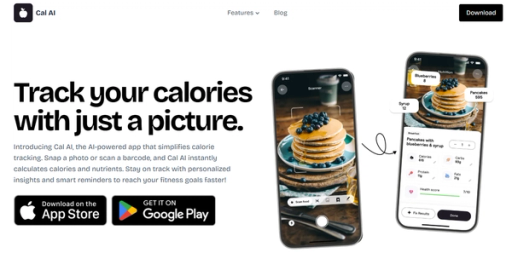
Cal AI transforms calorie tracking with our cutting-edge AI technology. Just snap a photo of your meal, and we'll do the rest. Our app combines your phone's depth sensor with advanced AI models to:
With 90% accuracy on visible foods and multiple tracking options, we've made nutrition tracking effortless. Options include:
Gone are the days of tedious manual logging calorie-tracking apps. Whether scanning a full meal or a quick snack, Cal AI gives you accurate nutritional information in under 15 seconds. Plus, our AI learns from your feedback, continuously improving its accuracy.
Stay on track with personalized insights and brilliant reminders. Cal AI makes achieving your fitness goals simpler than ever. Track your calories with your camera using Cal AI’s calorie tracker today.
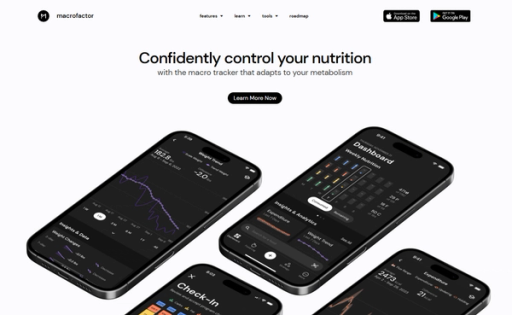
MacroFactor is a tremendous macro tracking app that applies equally to weight gain and weight loss goals. This app is like having a nutrition coach in your pocket because it provides updated calorie and macronutrient targets based on weekly goals and results. The app uses actual foods logged compared to weight and recorded measurements to provide weekly updated calorie/macro targets.
The app is designed to support long-term consistency, with some flexibility so that targets do not need to be hit perfectly each day, but rather paying attention to weekly average intake and weekly average weight. Highlights: you get updated calorie & macronutrient targets adapted based on your results. You have access to a sizeable verified food database. You are encouraged to focus on consistency over perfection.
Drawbacks
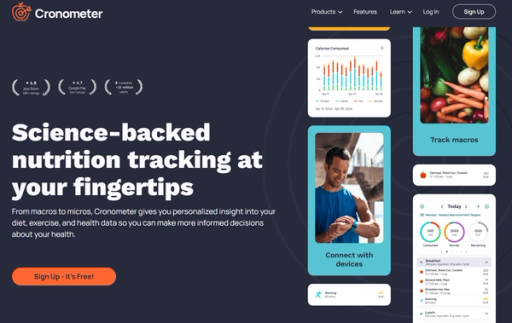
Cronometer is the perfect app for data nerds. It’s for people who want and/or need to track the very finest deta intake and rs. The app tracks up to 82 micronutrients, making it perfect for people who need to monitor specific nutrients (such as sodium or cholesterol).
Cronometer’s extensive food database has a unique feature. When users submit entries for addition to the database, they are reviewed for accuracy, and additional micronutrient information is added based on lab-analyzed data for similar foods.
For example, suppose a user adds brand-name oatmeal, and only 3-4 micronutrients are listed on the package label. In that case, Cronometer will automatically add the remaining micronutrient information based on lab-analyzed data for oatmeal.
Highlights
Drawbacks
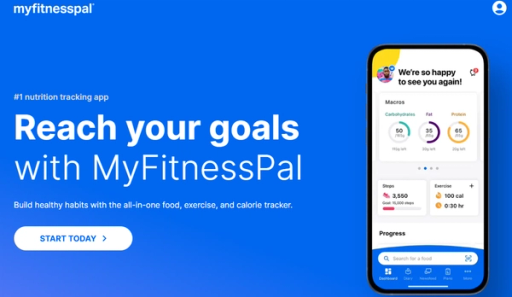
MyFitnessPal is one of the oldest and longest-standing nutrition apps on the market today. The app has tried to adapt to keep pace with trends like the keto diet, but its functionality is now behind a paywall, meaning that there are other apps with the same or better functionality at a lower cost.
That said, the app is still in widespread use for a reason. It has a huge food database that contains many more international and restaurant chain entries than many other apps.
Highlights
Drawbacks
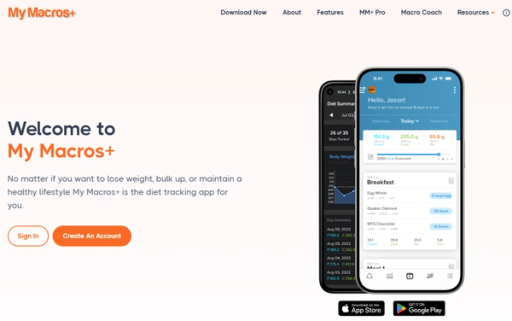
As its name suggests, MyMacros+ tracks macronutrients to help users achieve their goals, including weight gain. Like MacroFactor (our #1 pick), this app has a premium feature called Macro Coach, which provides weekly updated custom targets. While this app is not our first choice for macro tracking, it is highly user-friendly if you stick to essential foods.
You can easily change the serving size from cups to ounces to grams. I like this feature because I don’t always have my food scale handy, and I might be estimating portions based on volume measurements like cups instead of knowing the exact weight in grams.
The app is quite detailed in its several settings for your activity level, your desired rate of weight gain, and your preference for:
Highlights
Drawbacks
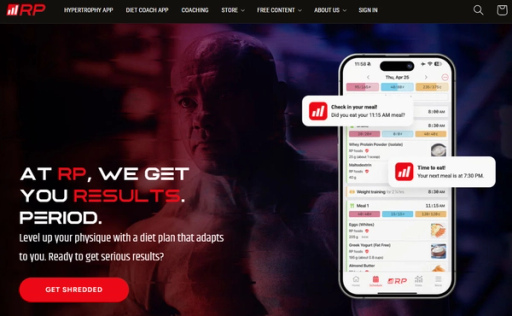
The RP diet is “Renaissance Periodization.” They focus on nutrient timing and getting most of your daily carb intake before, during, and after workouts to optimize performance and recovery.
The downside? The app is very rigid with setting macro targets for each meal. Not only are macro targets set for each meal, but users must also check whether they hit the targets for each meal or were over or under.
This level of rigidity makes the app unpopular with many people. This feature was super unappealing for me because it made me feel like a failure if I wasn’t hitting my macros perfectly at every meal and snack, which made me want to give up rather than celebrate the success when I hit my targets for the day.
Those who can stick to the app’s recommendations see good results with their muscle gain goals. The app is designed with serious athletes in mind (whether recreational or competitive). But, the app is less likely to provide a sustainable approach for most people in the long run.
You can copy meals, which is helpful if you often eat the same things and saves time.
Drawbacks
MyPlate by Livestrong is designed to track your calories so you can measure how many calories you need to gain weight and stay healthy. This app has a simple and clean interface and is easy for anyone to use.
MyPlate has many features, such as a comprehensive food database and barcode scanner to track food in seconds. You can also keep track of your weight over time to determine if your calorie intake is sufficient. This app requires you to submit profile information to receive personal daily calories to meet your goal.
One of the best features is 24/7 support from the MyPlate motivational community, which will share their inspirational stories and advice.
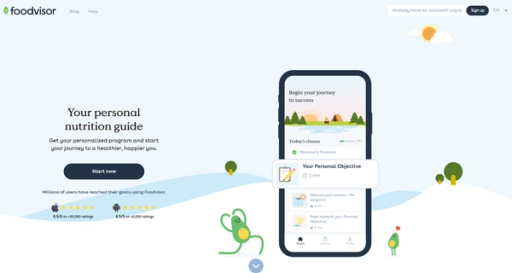
Foodvisor provides customized nutrition plans that can help you on your weight gain journey. With over 300 recipes, your meals will never be bland! This app can also count your meal calories by simply snapping a picture of your plate or scanning the barcode of the food/drink item. This feature can be helpful if you need to reach specific calorie goals to gain weight.
Highlights
Potential Drawbacks
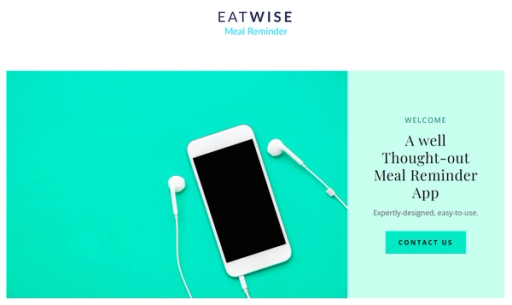
EatWise is excellent for individuals needing a reminder to eat at appropriate times. If you are trying to gain weight or stop unintended weight loss, this app can be handy by reminding you to have a snack and get your calories in for the day.
As we all do, getting caught up in our day-to-day activities is easy. This simple app makes gaining weight easier without even noticing it. EatWise lets you select how many meals you want daily and customize the time between meals and snacks.
Highlights
Potential Downsides
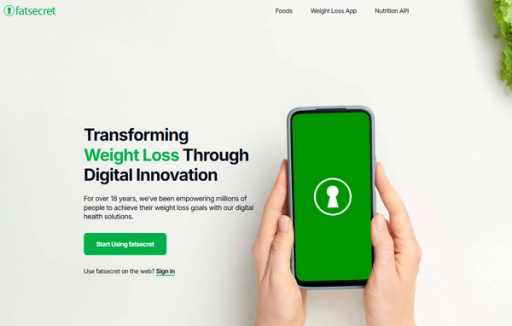
FatSecret is another excellent app for gaining weight. Its database contains over 1 million verified foods (in 20 languages). Wow! This app also lets you set meal reminders to never miss out on those much-needed calories.
FatSecret also has a barcode scanner and image recognition. This means that you can take a picture of your food, and the app will help identify it, making it easier to keep track of your meals.
Highlights
Potential Drawbacks
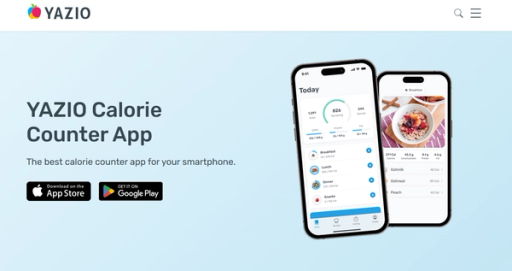
YAZIO Calorie Counter guides you with your food choices throughout the day. Unlike some calorie counters, it also recommends the calories for each meal, which is essential. You can set your current weight and goal weight, and then it will generate the recommended daily calorie intake.
It has a massive food and nutrient information list to track your diet correctly. Plus, you can also customize my macros and nutrient intake. You can easily log weight training and cardio activities and connect with Google Fit for step tracking.
Highlights
Potential Drawbacks
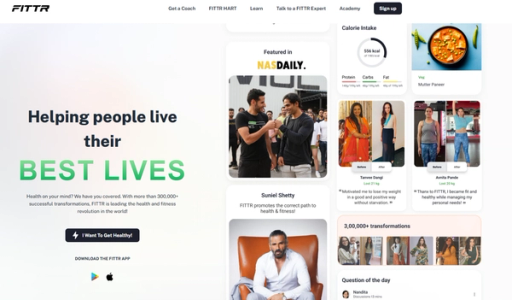
FITTR is not a calorie counter but an overall fitness app. While you can still track calories and basic nutrients, it’s unique because it provides a tailored plan for your weight goals (weight gain, maintenance, and loss).
The food and workout catalog is good. You will find most of the needed food and workouts easily. It also boasts a good community; you can find recipes or guides posted by fellow users or coaches. Besides these, it also has a macro calculator, BMR calculator, and reminders.
Highlights
Potential Drawbacks
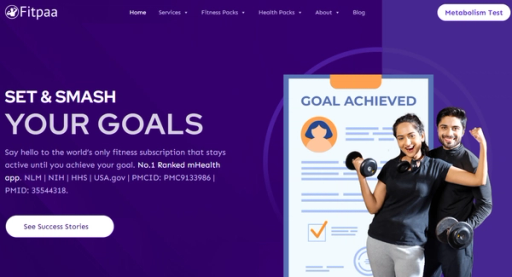
FITPAA is a fitness app that focuses on workouts more than diet plans. It includes free workout plans for muscle and mass gain and a basic meal plan. The diet plan is provided according to your status and fitness goal.
They are divided into three categories:
It will tell you the required calorie intake and nutrients (protein, carbs, and fat). Workout plans are weekly, and it will auto-generate plans for the next week. If you’re not sure about workouts, it also includes video tutorials.
Highlights
Potential Drawbacks
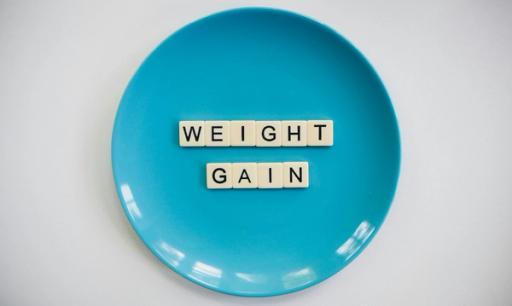
When it comes to weight gain, your calorie intake will determine whether you:
But, the macronutrient breakdown of those calories determines how much of that weight is lean muscle mass vs. body fat. So, choosing an app that gives you both a calorie target and an appropriate macronutrient split is essential to optimize lean muscle mass.
Since both calories and macronutrients are essential for muscle gain, the best apps for weight gain will suggest updates for both based on your progress to date.
All of your work to hit your calorie and macro targets won’t be as helpful if the app’s food database entries aren’t accurate. Apps must come with verified food entries.
A bonus feature is an inspiring recipe database so you don’t feel like eating boring and/or bland meals to hit your targets. Having some delicious recipes to look forward to can make hitting your targets easier and feel less like a chore.
Keeping track of circumference measurements, body weight, body fat percentage, and progress photos is a great way to see whether you add muscle or fat. However, only some apps offer the ability to track measurements.
The results you can expect when it comes to weight gain will depend on your starting point in terms of training age (the longer you’ve been training, the harder it is to make additional incremental gains), age (putting on muscle mass takes more work as you age), and hormonal status (male hormones are more naturally suited to gaining muscle).
Depending on these factors, gains can range from 0.5 to 2 lbs per month. No app alone will get you there, though.
To gain mass, you need to be in a calorie surplus. The app needs to be smart enough to continually adjust calorie and macro targets upwards to ensure that you’re genuinely in a calorie surplus, not just at a new higher maintenance level of calories.
For your muscles to continue to grow, you need to train sufficiently rigid to provide them with an anabolic (muscle-building) stimulus. Over time, your body will adapt to a certain weight and number of reps for an exercise, and if you don’t increase the weight and/or reps, your body won’t have any incentive to put on additional mass.
An app that allows you to track your sets, reps, and weights over time to ensure progress can be beneficial in ensuring that you continue to provide muscle-building stimulus. A nutrition app likely doesn’t have features like this, so you might want to look for a dedicated training app to track your workouts.
For a calorie surplus and a progressive resistance training program to work, they must be done consistently. Occasionally, having a calorie surplus, followed by days at or below maintenance, will not result in weight gain in the long term. Training hard some days or weeks and backing off the next will not provide the consistent stimulus needed to force adaptations in the form of additional muscle tissue.
Apps that track streaks send notifications to log in daily and/or provide rewards or badges as incentives to stay on track with your plan. This can lead to better results if they help you be more consistent with your nutrition and workout plan.
Hitting a calorie surplus, especially one with the correct macronutrient breakdown for optimal body composition, doesn’t happen accidentally. Apps that allow you to pre-log your foods in advance (nearly all of them do) will allow you to plan your meals so that you know what and how much to eat. Of course, having this plan is pointless if you don’t have those foods on hand. The best apps will give you a shopping list of what you need to make your planned meals.
Food quantity is more important than food quality when gaining weight. It doesn’t matter how high quality your foods are if you’re not eating enough to be in a calorie surplus. That said, you want to feel your best from the food you eat to maximize your training sessions and recovery.
So, apps that allow you to monitor your intake in terms of quality can ensure that you’re not short-changing yourself on micronutrients (vitamins & minerals) needed for health if you’re choosing processed foods more often to help with hitting your calorie target without feeling over-full.
Cal AI transforms calorie tracking with our cutting-edge AI technology. Just snap a photo of your meal, and we'll do the rest. Our app combines your phone's depth sensor with advanced AI models to:
With 90% accuracy on visible foods and multiple tracking options, we've made nutrition tracking effortless. Options include:
Gone are the days of tedious manual logging calorie-tracking apps. Whether scanning a full meal or a quick snack, Cal AI gives you accurate nutritional information in under 15 seconds. Plus, our AI learns from your feedback, continuously improving its accuracy.
Stay on track with personalized insights and brilliant reminders. Cal AI makes achieving your fitness goals simpler than ever. Track your calories with your camera using Cal AI’s calorie tracker today.
Calorie tracking can help you achieve your fitness goals. It provides invaluable insight into your eating patterns, helping you understand how your daily food intake affects your body. If you want to lose weight, tracking calories can help you identify areas where you can cut back and make healthier choices.
If you’re going to gain weight, tracking calories can help you determine how many calories you need to eat to reach your goals and monitor your progress along the way.